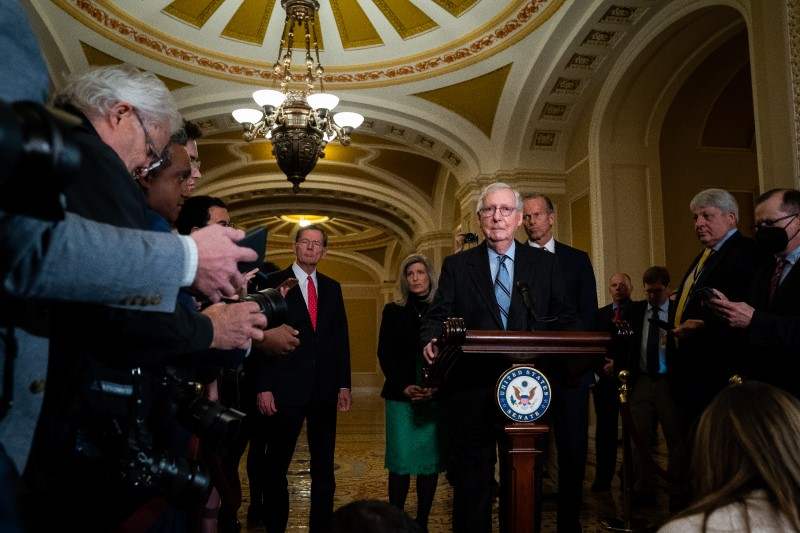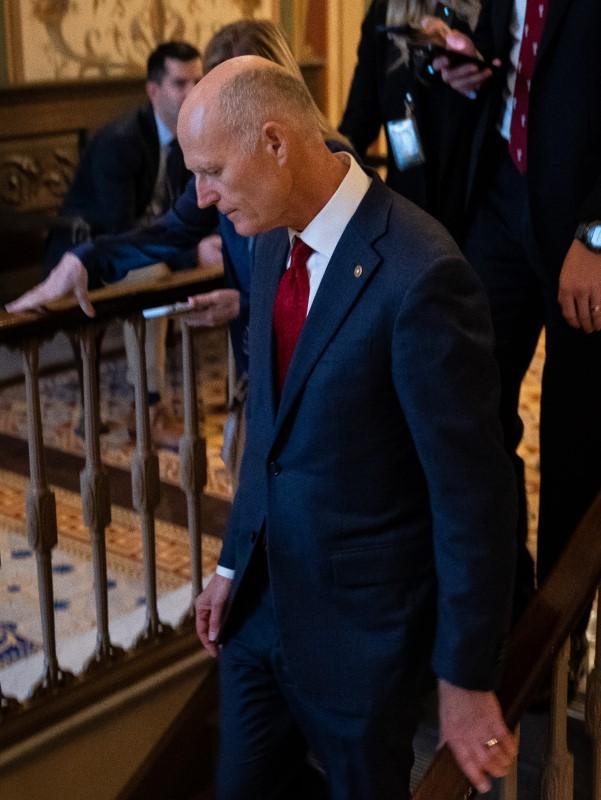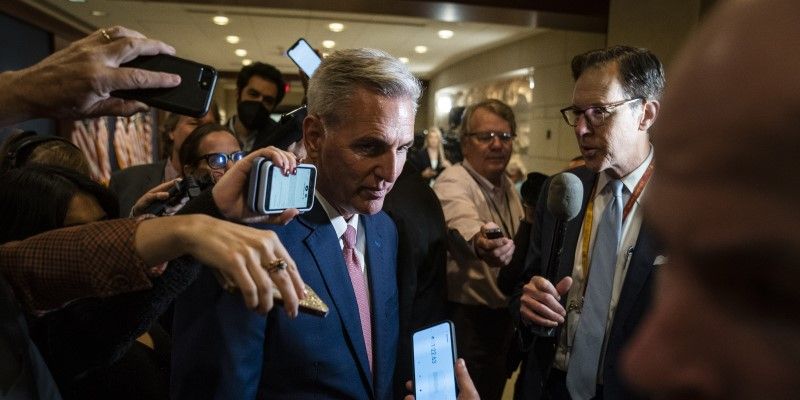
Senate Minority Leader Mitch McConnell (R-Ky.) at a news conference Tuesday.
15:47 JST, November 16, 2022

Sen. Rick Scott (R-Fla.) at the Capitol on Tuesday.
WASHINGTON – Republicans in both chambers of Congress mounted challenges to their leaders on Tuesday as disappointment over their lackluster performance in the midterm elections manifested in infighting and instability in the Capitol.
House Minority Leader Kevin McCarthy (R-Calif.) won his party’s nomination for speaker Tuesday afternoon with 188 votes from the GOP caucus – well past the simple majority needed for victory. But 31 lawmakers voted for a challenger, presenting a steep obstacle for McCarthy come January, when he will need 218 votes to win the speakership when the 118th Congress convenes.
And in the Senate, Sen. Rick Scott (R-Fla.) announced he would challenge Minority Leader Mitch McConnell (R-Ky.) during an hours-long airing of grievances among party members frustrated over their failure to win back the chamber. McConnell conceded that the group’s leadership elections, set for Wednesday morning, could be delayed if a majority of the caucus votes to postpone them.
“I want to repeat again – I have the votes, I will be elected,” McConnell told reporters after emerging from the party meeting. “The only issue is whether we do it sooner or later.”
The discord came just hours before Donald Trump was expected to announce his presidential reelection bid from Florida, injecting another note of turmoil on the Hill between those who remain staunch allies of the former president and others who are beginning to publicly question whether Trump contributed to the party’s stunning failure to win more seats last week. Midterm elections typically favor the party that doesn’t hold the White House, and many Republicans were predicting a “red wave” that failed to materialize in either chamber as battleground voters rejected many of the candidates most vocally committed to Trump’s false claim that he won the 2020 election.
House Republicans are expected to gain a razor-thin majority after the remaining congressional races from last week’s elections are decided. Senate Republicans lost a seat in Pennsylvania to Democrat John Fetterman, and are battling to flip one in Georgia in a runoff vote next month to avoid seeing their minority shrink further.
“This new Republican leadership is ready to get to work,” McCarthy said confidently after the elections. But he conceded that with such a small majority, even just a few members wield a lot of power. “Either we’re going to lead as a team or we’re going to lose as individuals.”
‘A long way from 218’
McCarthy faced a challenge for the speakership from Rep. Andy Biggs (R-Ariz.), a member of the ultraconservative House Freedom Caucus who on Monday had announced his intention to run.
“The American people want us to turn a page. They do not want excuses or performance art, they want action and results,” Biggs wrote Monday on Twitter. “The promised red wave turned into a loss of the United States Senate, a razor-thin majority in the House of Representatives, and upset losses of premiere political candidates.”
Biggs and other House Freedom Caucus members have long been critical of McCarthy, criticism that ramped up following the Jan. 6, 2021, insurrection at the Capitol, during which McCarthy was recorded blaming Trump for the attack and pledging to urge Trump to resign. McCarthy later pivoted to supporting Trump and voted against efforts to impeach him.
“To believe that Kevin McCarthy is going to be speaker, you have to believe he’s going to get votes in the next six weeks that he couldn’t get in six years,” Rep. Matt Gaetz (R-Fla.) said. He said he didn’t believe McCarthy would become speaker and that he wouldn’t vote for him in January.
Another Freedom Caucus member, Rep. Bob Good (R-Va.) noted, “One hundred eighty-eight is a long way from 218. I think this just opens up the opportunity for anyone interested to let us know what their vision is.”
The two most recent speakers, Nancy Pelosi (D-Calif.) and Paul Ryan (R-Wis.), also faced some rebellion initially, but they received 203 and 200 votes, respectively, in their 2018 and 2015 bids for speaker. Those are significantly higher starting points than McCarthy’s in his bid for 218 votes. Biggs has suggested he may not run against McCarthy again in January, however, leaving the McCarthy opposition without anyone to rally around. And some Freedom Caucus members, including Rep. Marjorie Taylor Greene (R-Ga.), are backing McCarthy.
To win the speakership in January, McCarthy will probably be forced to make concessions to some of the House’s most conservative Republicans. But with his majority so slim, moderate members will also be able to make demands.
“He’s going to have to make a deal with the devil, and if he does, he’s also going to have to contend with the centrists and growing number of moderates in the conference,” said one Republican lawmaker who spoke on the condition of anonymity to be candid. “We’re usually the first to fold but we won’t this time. It’s too important for the future and longevity of our party.”
Some members hope dysfunction does not loom.
“It’s all right to disagree, to debate . . . but gridlock does not work, especially with a three- or four-seat majority,” said Rep. Don Bacon (R-Neb.), a more moderate member. “We need to work together. And it’s not just for the party, it’s for the country. . . . We need to have a stable, predictable two years.”
In other leadership elections, House Minority Whip Steve Scalise (R-La.) was elected majority leader on a voice vote. And Rep. Elise Stefanik (R-N.Y.), a onetime centrist who became a vocal Trump ally, won reelection as the chair of the Republican conference, the No. 3 position in House GOP leadership.

House Minority Leader Kevin McCarthy (R-Calif.) talks with reporters on his way to a meeting Tuesday.
Raucous Senate meeting
In the Senate, Republicans spent hours Tuesday afternoon locked in an intense, closed-door conversation about why the party failed to gain a single seat in last week’s elections. Several members again called for Wednesday’s leadership elections to be postponed, and Scott announced he would formally challenge McConnell for the top spot.
Scott’s challenge marks the first contested race for Senate leader for either party since 1996, and one that is shaping up to center on who deserves blame for the midterms.
Scott, who chaired the National Republican Senatorial Committee, received a lot of criticism for how he raised and allocated funds this cycle, while McConnell, who is associated with a political action committee that spent more than $230 million backing Republicans, has been criticized by Trump and his allies for not doing more to help unsuccessful GOP Senate candidates in Arizona and New Hampshire.
McConnell is known for his tight grip on his caucus, and so far only a handful of Republicans have been vocal in their criticism of him. Since leaving office, Trump has launched multiple attacks on McConnell and his wife, contributing to some of the fractures within the party.
During the hours-long meeting that became what one senator had predicted the day before would be an “airing of grievances,” about 20 senators spoke, and some of them got heated, according to Sen. Mike Braun (R-Ind.), who is supporting Scott and called the meeting a “serious discussion” about where the party goes from here.
“Senator Scott disagrees with the approach that Mitch has taken in this election and for the last couple of years, and he made that clear,” said Sen. Josh Hawley (R-Mo.), who opposes McConnell for leader. “And Senator McConnell criticized Senator Scott’s management of the NRSC.”
McConnell mostly listened during the meeting, according to one senator present, and only interjected a few times when the discussion got “out of line.”
The conversation felt like a festival of blame.
“There was finger-pointing at the leader,” said the senator, who spoke on the condition of anonymity to discuss the meeting frankly. “There was finger-pointing at the NRSC. There was finger-pointing at Trump. There was finger-pointing at the candidates who had gone too far to the right and denied elections in the primaries. There was a lot of finger-pointing going on.”
In closing remarks, McConnell told the group he doesn’t mind not being liked as long as he makes sure Republican senators are successful.
In a lengthy letter to GOP colleagues, Scott said there was “no one person responsible for our party’s performance across the country.” He criticized the leadership for not releasing a Republican agenda.
Some Republicans expressed skepticism that Scott was the right person to challenge McConnell.
“If you’re going to make this about assessing blame for losing an election, I don’t know how the NRSC chairman gets off the hook,” said Sen. Kevin Cramer (R-N.D.), who is backing McConnell.
Others have pointed out that Scott’s decision to release a Republican agenda that included reauthorization votes for Social Security and Medicare and tax increases for low-income people provided a potent line of attack for Democrats this cycle.
“If you liked Republicans losing Senate campaigns, while saddling the party with tax increases and Medicare cuts, then you’re going to love Rick Scott’s campaign for leader,” McConnell adviser Josh Holmes said in a statement. “It does have a constituency but unfortunately for him it’s entirely within the confines of the Democratic conference.”
Many frustrated Senate and House Republicans had previously called to delay leadership elections in both chambers. On Monday, dozens of conservative leaders sent an open letter to Republican members of Congress to urge them to postpone their leadership elections until after the Dec. 6 Senate runoff election in Georgia.
“The Republican Party needs leaders who will confidently and skillfully present a persuasive coherent vision of who we are, what we stand for, and what we will do,” the letter stated. “We strongly urge both Houses of Congress to postpone the formal Leadership elections until after the December 6 runoff in Georgia and all election results are fully decided.”
The letter was signed by 72 conservative leaders, including Virginia “Ginni” Thomas, a lawyer and the wife of Supreme Court Justice Clarence Thomas; Matt Schlapp, chairman of the Conservative Political Action Coalition; and Mark Meadows, who was chief of staff in the Trump White House.
Republicans are expected to vote on a delay Wednesday morning. If the vote fails, McConnell is expected to stay on top, which would set him up to become the longest-serving leader of either party in the Senate.
Top Articles in News Services
-

Survey Shows False Election Info Perceived as True
-

Prudential Life Expected to Face Inspection over Fraud
-

Hong Kong Ex-Publisher Jimmy Lai’s Sentence Raises International Outcry as China Defends It
-

Japan’s Nikkei Stock Average Touches 58,000 as Yen, Jgbs Rally on Election Fallout (UPDATE 1)
-

Japan’s Nikkei Stock Average Falls as US-Iran Tensions Unsettle Investors (UPDATE 1)
JN ACCESS RANKING
-

Japan PM Takaichi’s Cabinet Resigns en Masse
-

Japan Institute to Use Domestic Commercial Optical Lattice Clock to Set Japan Standard Time
-

Israeli Ambassador to Japan Speaks about Japan’s Role in the Reconstruction of Gaza
-

Man Infected with Measles Reportedly Dined at Restaurant in Tokyo Station
-

Videos Plagiarized, Reposted with False Subtitles Claiming ‘Ryukyu Belongs to China’; Anti-China False Information Also Posted in Japan


























